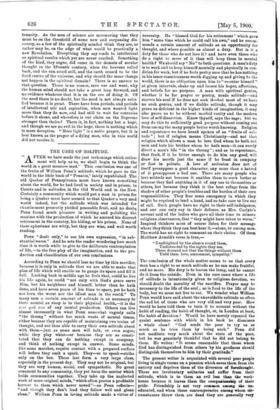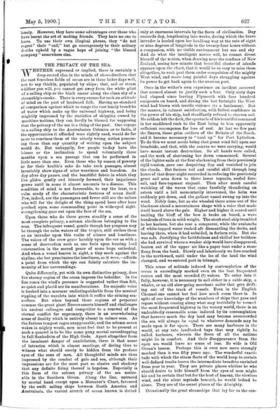THE USES OF SOLITUDE.
Penn "dealt only," to use his own expression, "in sub- stantial wares." And he sets the reader wondering how much time it is worth while to give to the deliberate contemplation of life,—to the free play of the imagination, and to the pro- duction and classification of our own conclusions.
According to Penn we should lose no time by this sacrifice, because it is only in solitude that we are able to make that plan of life which will enable us to gauge its space and fill it fall. Looking back in middle age he feels that, could he live his life again, he could "not only with God's grace serve Him, but his neighbour and himself, better than he bath done, and have seven years of his time to spare, yet he hath not been the worst nor the idlest man in the world." To many men a certain amount of solitude is as necessary to their mental as sleep is to their physical health,—it is the s,ne qua, non of any mental production. Others can live almost incessantly in what Penn somewhat vaguely calls "the throng" without too much waste of mental tissue, either because they are capable of maintaining two trains of thought, and are thus able to carry their own solitude about with them—just as some men will talk, or even argue, while they play whist—or because they are so consti- tuted that they can do nothing except in company, and think of nothing except in answer. Some minds, like some matches, require contact with a prepared surface will before they emit a spark. They—so to speak—strike only on the box. These last form a very large class, especially in the present day. They may not be original, but they are very human, social, and sympathetic. No great ornament to any community, they yet form the mortar which holds communities together. They take up the neglected work of more original minds," which often proves a profitable harvest to them which never sowed"—as Penn reflects- " and though they don't lead they follow well and glean clean." William Penn in loving solitude made a virtue of
necessity. He "blessed God for his retirement" which gave him "some time which he could call his own," and he recom- mends a certain amount of solitude as an opportunity for thought, and where possible as almost a duty. Bat is it a duty for those who do not love it ? and have even those who do a right to more of it than will keep them in mental health l We should say " No " to both questions. A man's duty is to work and to keep himself mentally and physically in con-
dition for work, but if he feels pretty sure that he has nothing in his inner consciousness worth digging up and giving to the world, there is no obligation upon him to" re-enter himself " at given intervals, shake up and loosen his hopes, affections, and beliefs for no purpose. A man with spiritual genius, whether it be for prayer or poetry, needs solitude—and starves his soul if he does not seek it—but most of us have no such genius, and if we dislike solitude, though it may prove us deficient in the higher kinds of imagination, it may also prove us to be without morbid vanity and the modern love of self-dissection. Know thyself, says the sage; but we may do this to sufficiently good purpose without coming out from among the many people better worth knowing. Religion and repentance we have heard spoken of as "fruits of soli- tude " ; but if religion means Christianity—and not that religion which allows a man to love God whom he hath not seen and hate his brother whom he hath seen—it can surely direct a man's life "in the throng "; and as to repentance, that fruit, if it be bitter enough to do him any good, will draw his mouth just the same if he feast in company or fast in private. A love of seclusion does not of itself presuppose a good character, any more than a hatred of it presupposes a bad one. There are many people who love solitude not because it enables them to work better or because they find anything in it of any use to themselves or others, but because they think it the best refuge from the shadow of other people's troubles and the burden of their own responsibilities. They fear some emergency in which they might be required to lend a hand, and so take care to live out
of call. Such people have no right to their self-indulgence, and one can only say in their defence, as Mrs. Carlyle's servant said of the ladies who gave all their time to minute religions observances, that "they might have taken to worse." Inspired thinkers must of course listen for their message where they think they can best hear it,—alone, or among men. The world has no right to comment on their choice. Of them Matthew Arnold's verse is true,—
" Unaffrighted by the silence round them, Undistracted by the sights they see,
These demand not that the things without them Yield them love, amusement, sympathy."
The conclusion of the whole matter seems to us that every man has a right to as much solitude as he can make fruitful, and no more. His duty is to leaven the lamp, and he cannot do it from the outside. Even in the rare cases where a life of solitude is intentionally given to religions devotion, we should doubt the morality of the sacrifice. Prayer may be necessary to the life of the soul ; so is food to the life of the body, but we must not live to eat. We wonder what William Penn would have said about the unavoidable solitude so often the sad lot of those who are very old and very poor. How would he have told them to turn it to account without the habit of reading, the habit of thought, or, in London at least, the habit of devotion ? Would he have merely repeated the quaint sentence with which in his book he dismisses
a whole class? "God sends the poor to try us as much as he tries them by being such." Penn did not meditate very much about the state of the poor, but he was genuinely thankful that he did not belong to
them. He writes: "It seems reasonable that those whom God has distinguished from others by his goodness should distinguish themselves to him by their gratitude."
The present writer is acquainted with several poor people living in single rooms on a pension which saves them from the anxiety and deprives them of the diversion of forethought. These are involuntary solitaries and suffer from their solitude, which is to them an evil less than the work- house because it leaves them the companionship of their pride. Friendship is not very common among the un- educated, and when those contemporaries among whom cir- cumstances threw them are dead they are generally very lonely. However, they have some advantages over those who have learnt the art of making friends. They have no one to leave. To use their own illogical phrase, they "do not regret" their "call," but go courageously to their solitary cbaths upheld by a vague hope of joining "the blessed company" somewhere else.







































 Previous page
Previous page